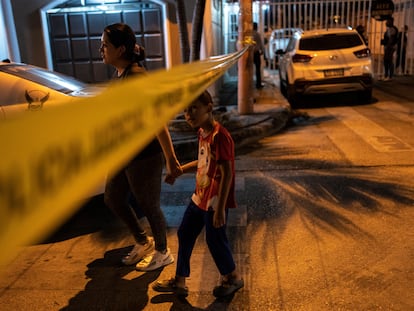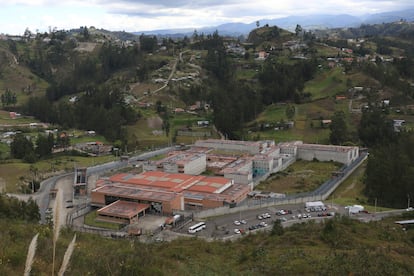Nine journalists flee Ecuador in 2023, pushed out by organized crime
‘I feel like a part of my life was taken away from me that will not come back,’ says a reporter who is now living in exile

Only a few hours passed between Karol Noboa learning about the death threat and her getting on a plane, bound for exile. For the 28-year-old Ecuadorian journalist, those hours felt like days. She said goodbye to the country, where she had worked as a reporter for eight years, leaving her family and friends confused, without fully understanding why she was leaving. “I feel a deep defeat. I feel like a part of my life was taken away from me that will not come back. The moment I got on the plane, I knew that I had to live with what is called exile,” says the journalist, who covered issues related to criminal gangs and their links with organized crime.
Noboa was the first journalist to flee the country due to threats against her life. Her reports, published in the media GK, narrate precisely what triggered the prison massacres that occurred in the country earlier this year, who participated in them, and the corruption inside the Ecuadorian penitentiary centers. Naboa knows the dynamics of criminal gangs very well; she grew up in the Quito neighborhoods where gangs were part of the social structure. Without fully understanding what exile is, she believed that she would be able to return in a few days. It’s been nine months, and she’s moved to two different countries. “The first months, there was such a deep fall that it disconnected me from everything, emotionally it affected me a lot, to the point of not being able to write,” she adds.

In 2023, nine journalists have had to go into exile due to threats against their lives. “This has surprised us, because it had not happened before in Ecuador, and this year it has become systematic, and we have had to learn what to do as we go,” explains Diana Romero, from Periodistas Sin Cadenas (Journalists Without Chains). The second journalist to flee the country was Charly Castillo, a young journalist from Durán, a city on the Ecuadorian coast, who was kidnapped by organized crime. “The threats to him were very serious. They left bags with blood on them outside his house, and since Durán is so small, people know him very well, and he received a message that they wanted to kill him,” adds Romero.
Between January and October of this year, the NGO Fundamedios registered 219 threats of attacks against journalists and media outlets in Ecuador. In the midst of the presidential elections in October, it saw the largest number of threats. Three reporters went into exile in this period, including María and Juan (not their real names), a couple of journalists who have an open frequency radio in the Amazon. The small town where they live has less than 5,000 inhabitants. Everyone knows each other, especially the only media outlet in the area. “We became the voice and the ear of the people, we were told everything, the people’s calls for help, the needs they have,” says María. But the threats they received have completely restricted freedom of expression. “They have forced us to be a music station. We have had to tone down the editorial line, we had to be light-hearted, and that also takes away our connection and reduces our finances,” she adds.
The last threat was blunt: a guy on a motorcycle warned them that they had to leave. One night, in hiding, María, Juan and their two daughters left the small rural Amazonian town and headed into exile. “We thought we would be able to return a few weeks later, but we realized that it would not be possible,” says María. “We had to tell [the children] that we were going on vacation, ‘pack your skates, the ball and your clothes and let’s go.’ ‘When are we coming back, mommy?’ they kept asking. I told them that we were going to be away a month, and they began to count the days — ‘15 days left, ten days left’ — until we had to tell them that we weren’t going back.”
María and Juan’s struggles began when they investigated the operation of micro-trafficking groups on the northern border, where cocaine enters Quito. “We obtained testimonies from parents with children affected by drug consumption, and that led us to learn about several of the links in the microtrafficking chain,” explains Juan. The report could never be published.
All the cases have something in common: journalists cannot report attacks, they cannot even ask the police for security because there is enough evidence to suggest that the authorities themselves are involved with organized crime. Reporters also do not trust the justice system, nor the other state institutions, which still have provided no clarification about who was responsible for the kidnapping and murder of reporters from the newspaper El Comercio, which took place in 2018 on the northern border.
Journalists in the Amazon, in addition to facing the threats of organized crime, also face tensions due to the area’s oil and mineral deposits. Marcos (fictitious name) was the third journalist to go into exile. He did research on block 28, a platform that was set to be installed in the Llanganates-Sangay corridor, one of the most important natural reserves in the country that crosses the Andes and the Amazon. The water generated in this place supplies the Indigenous communities of the Amazon.
The first attack that Marcos received was at his home. A group of criminals hit him while looking for his computer, external hard drives and any electronic devices. “They made a hole in the kitchen, destroyed doors, things they found along the way, and everything was left like that, destroyed, I couldn’t even fix it,” he says.
After the second attack, the odyssey to leave Ecuador began. “The hardest thing about exile is not even the economic aspect and how all your savings are gone, but rather being far from family and how it shakes up their lives,” says Marcos.
No state institution properly protects the press in Ecuador, beyond issuing documents denouncing the attacks. Civil society has created the Protection Table for Journalists, which coordinates with international foundations to provide financial aid to exiles. Of the nine journalists who had to leave the country, only two have been able to return and are continuing to work as reporters: Anderson Boscán and Mónica Velásquez from the media outlet La Posta. The other seven journalists are living in hiding, and getting by with international help.
Sign up for our weekly newsletter to get more English-language news coverage from EL PAÍS USA Edition
Tu suscripción se está usando en otro dispositivo
¿Quieres añadir otro usuario a tu suscripción?
Si continúas leyendo en este dispositivo, no se podrá leer en el otro.
FlechaTu suscripción se está usando en otro dispositivo y solo puedes acceder a EL PAÍS desde un dispositivo a la vez.
Si quieres compartir tu cuenta, cambia tu suscripción a la modalidad Premium, así podrás añadir otro usuario. Cada uno accederá con su propia cuenta de email, lo que os permitirá personalizar vuestra experiencia en EL PAÍS.
¿Tienes una suscripción de empresa? Accede aquí para contratar más cuentas.
En el caso de no saber quién está usando tu cuenta, te recomendamos cambiar tu contraseña aquí.
Si decides continuar compartiendo tu cuenta, este mensaje se mostrará en tu dispositivo y en el de la otra persona que está usando tu cuenta de forma indefinida, afectando a tu experiencia de lectura. Puedes consultar aquí los términos y condiciones de la suscripción digital.








































